
“Things usually work out in the end."
"What if they don't?"
"That just means you haven't come to the end yet.”
#DoubleLetterTitle #DynamicDs
@Alwaysbeenaloverofbooks

“Things usually work out in the end."
"What if they don't?"
"That just means you haven't come to the end yet.”
#DoubleLetterTitle #DynamicDs
@Alwaysbeenaloverofbooks
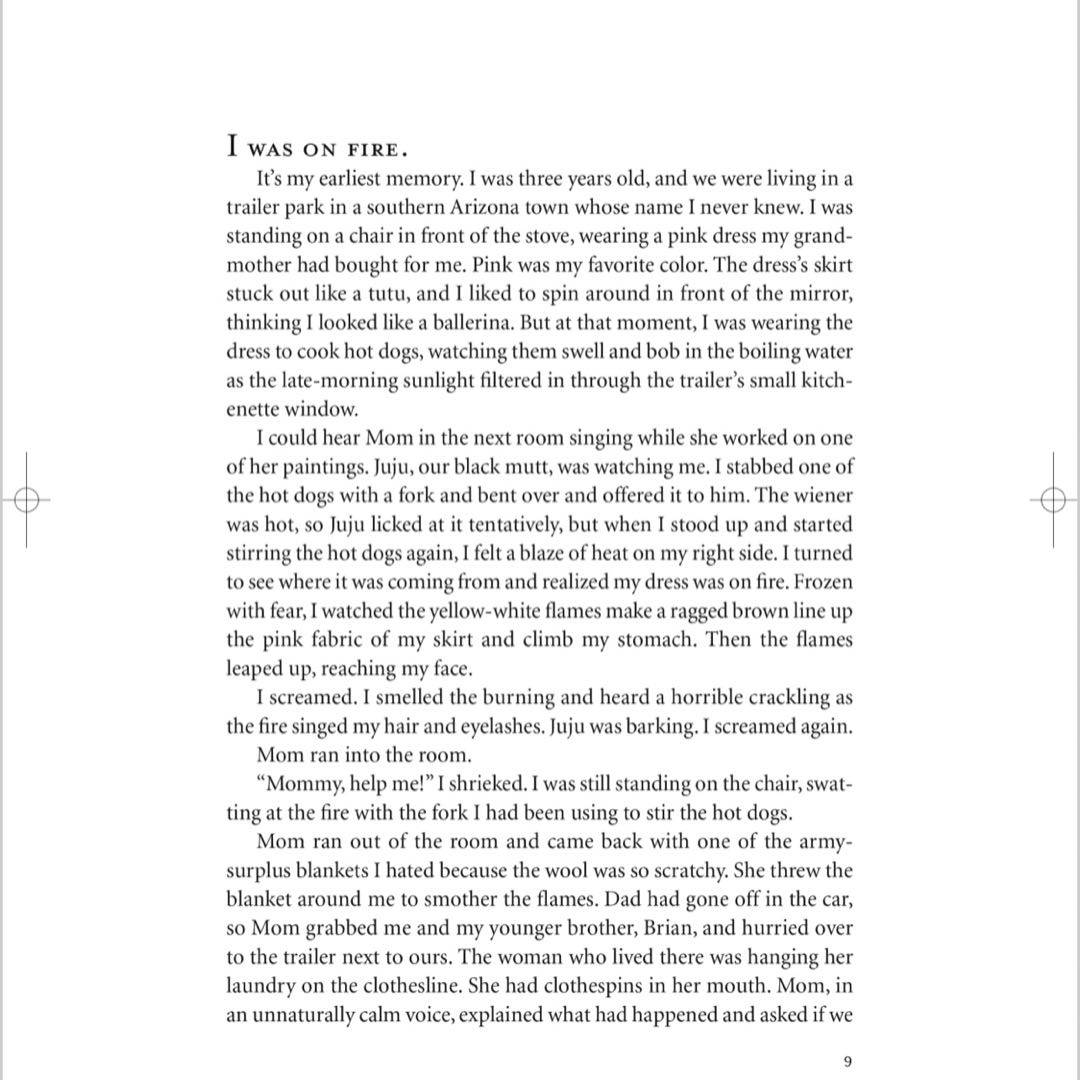
Personification is often used especially with the object of fire. The author shows fire as Jeanette‘s emotions and reasoning for why she was the way she is but also conveys an ongoing theme of her upbringing. The fire adds Jeannette‘s fascination with fire and chaos. I think that it helped me understand Jeanette‘s upbringing and identity better. I think that the fire stands for Jeanette never knowing whether her family had done more good then harm
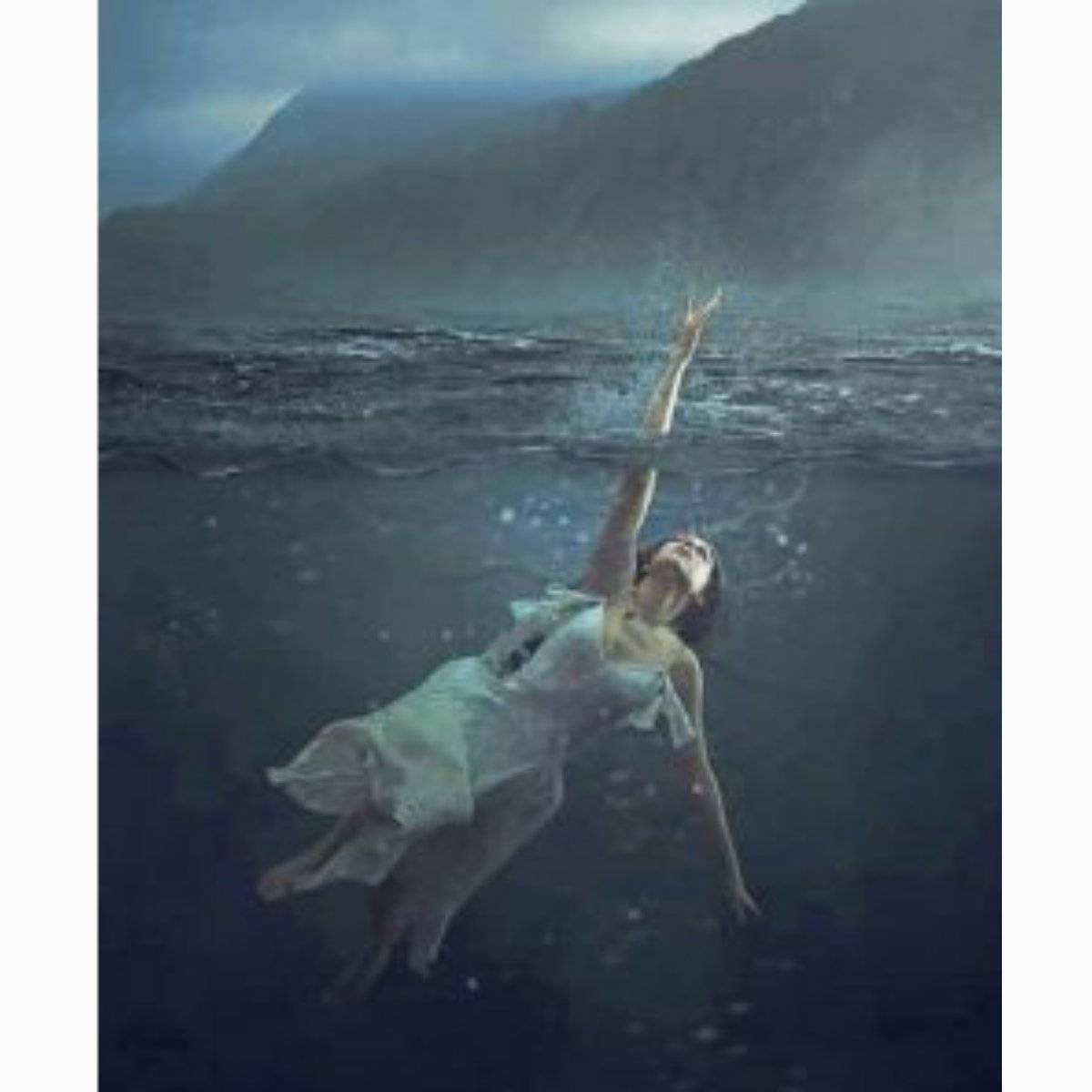
On page 195, Rose Mary painted an image of a lady drowning in a stormy lake. This would be considered a symbol of her true feelings. It shows how she feels inside with all the pressure she feels from her family to get a job. It also means that she has too much on her plate, mentally and physically.
Jeannette wrote this story in this way because it shows that her mother was doing what she thought was best. The mother does not show many emotions..
A metaphor in glass castle can be seen by the title. The glass castle can be seen as a Rex walls, Jeanettes father, false hopes and dreams for their family. He carries around blueprints for the glass castle he wants to build. The author probably used this as the title for the book because throughout her child hood she was living in a goofy world growing up.
I think this was a very smart title because it was prevalent throughout her story.
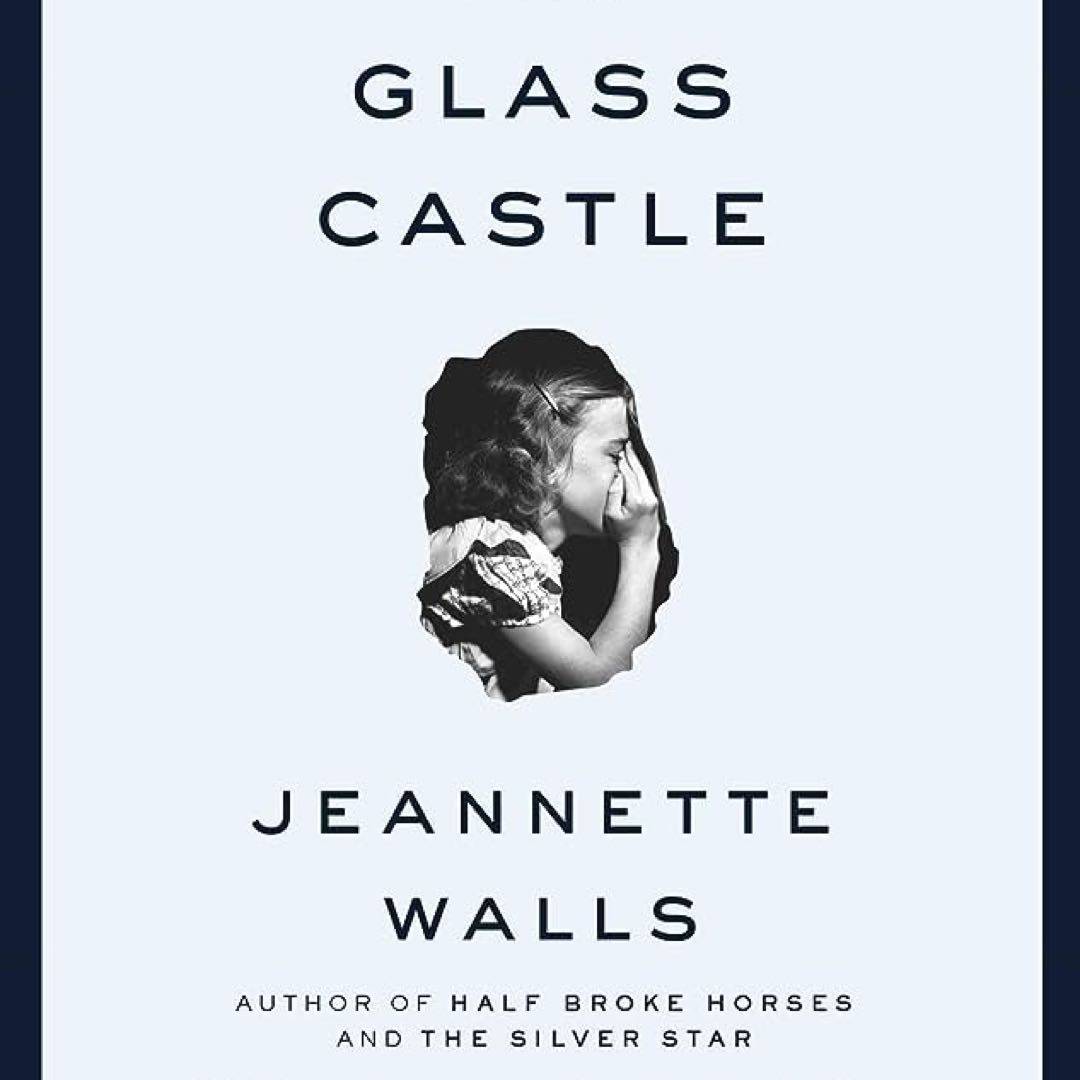
A very common literary device used in this book was a metaphor. Jeannette compared her relationship with her family to a glass castle. This adds meaning that it was delicate and fragile. I believe Jeannette used this comparison because it had a close personal connection to her. I personally believed this was a very interesting way of describing a relationship with your family while comparing it to glass.
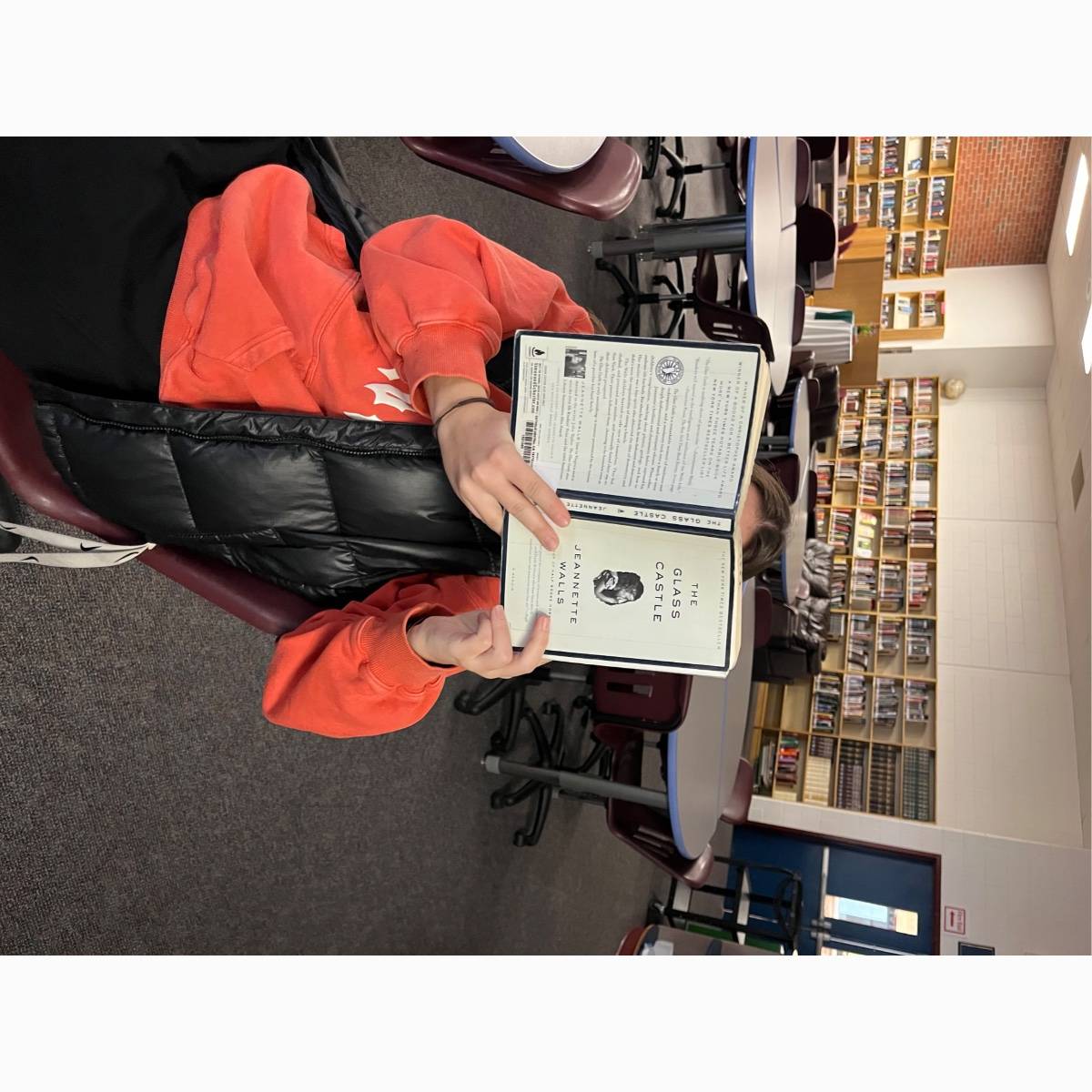
Personification is a commonly used literary tool throughout the novel. When Jeanette is burned by fire as a child she depicts it as dancing. This adds to the story by showing the battle Jeanette faces with fire and making the novel more life-like and helps us feel as though we are in the moment. Any author would use personification would use this tool for the same reason that Jeannette did. Adding emotion to the moment.

The Glass Castle is a harrowing journey into the life of Jeannette Walls, a woman born into extreme poverty, abuse and neglect at the hands of her parents, Rex and Rose Mary Walls. The story follows her journey from her birthplace in Tucson, extended life in Welch, WV, and finally her rise to success in New York. Rex Walls, her father, is the primary antagonist. Through his violent alcoholism, he lies, cheats, neglects and steals from the family.

The biggest literary device is a metaphor for the glass castle, I feel like Jeannette Walls used this because it is an accurate representation of her life. Showing how she is promised by her dad for glass castle that he builds. But as she grows older and matures she realizes that he is man filled with broken promises.

It was pretty good, I thought that it was very cool that Jeannette stay so positive throughout the novel, even though her situation was not great. Perseverance. Jeannette pulled through in all of her situations, always moving forward. Without that, this novel would have gotten nowhere. Jeannette chose to use this because this novel was and actual real life experience, meaning she was persevering her whole childhood.
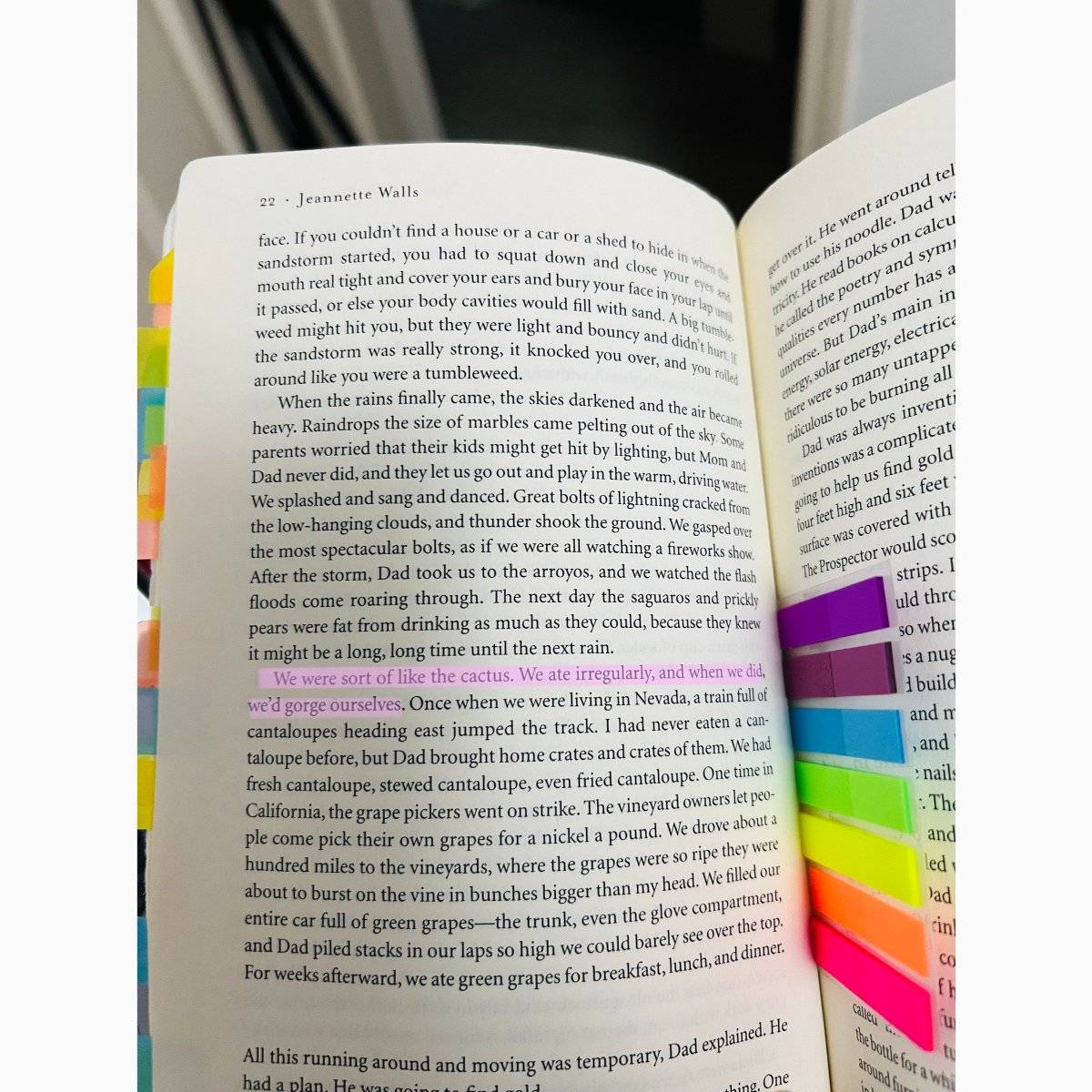
I think one of the most used literary devices in The Glass Castle is similes, they give meaning to the text beyond just the words used, it tests the reader's knowledge of the outside world but also helps them relate their own experience to the text.
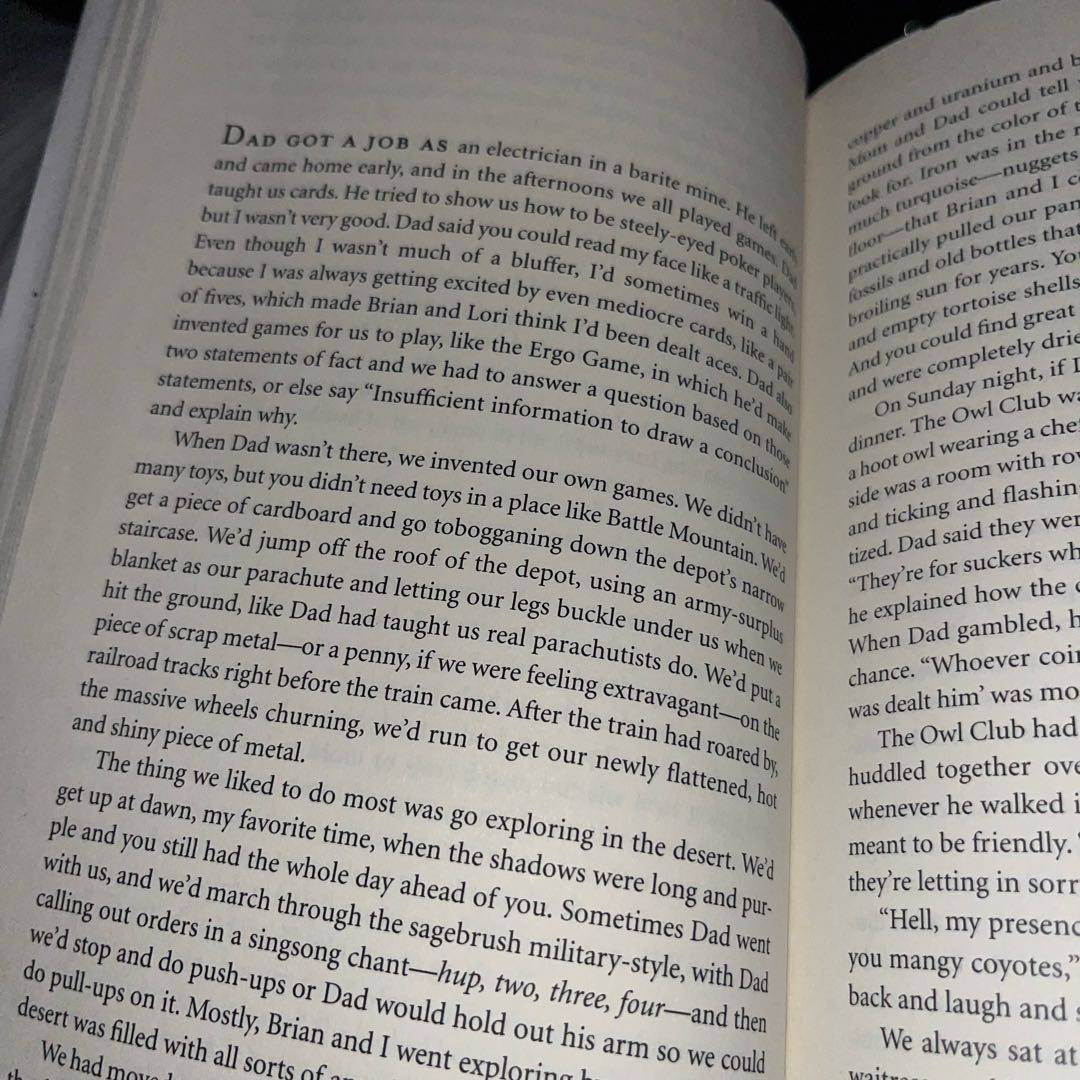
“Dad said you could read my face like a traffic light.”(54) This is a simile from the novel which represents the genuine honesty of Jeannette which is truly revealed throughout the rest of the novel. I think Jeannette added this to simile to the story because it signifies her innocence and purity as she is easily exposed by her integrity. The simile compares Jeannette to a traffic light the way she is easily readable.

The glass castle is a beautiful memoir that shows the beauty that can come from chaos. One of the many literary devices Jeannette Walls used to convey this was the running motif of the glass castle. Not only was this symbol the title of the book, it continued to pop up throughout in order to highlight important themes such as false hope, delusion and deception in the lives of the Walls family.
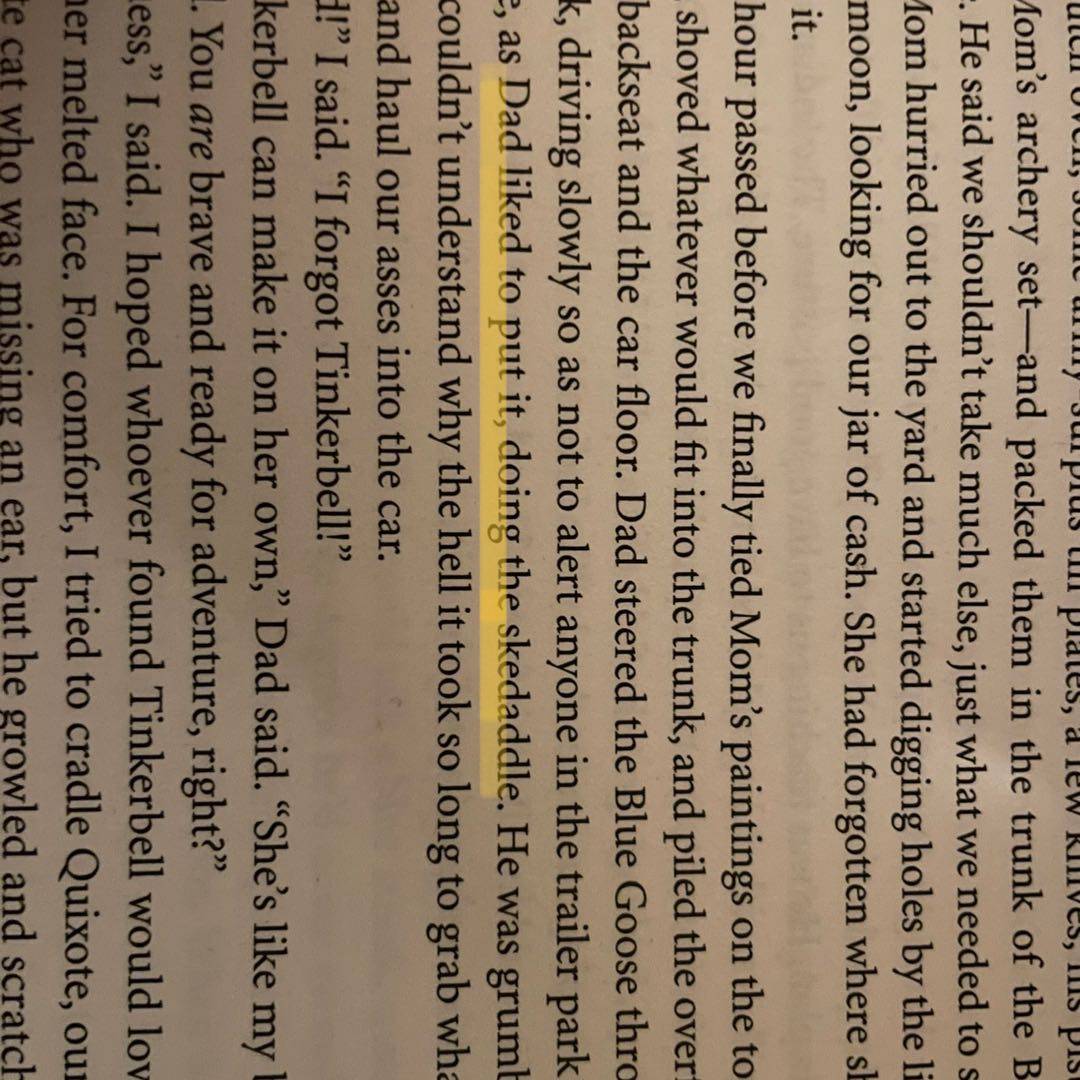
One of the most prevalent literary devices used in The Glass Castle is euphemism. Euphemism is so important in the book because of how it shows us how Jeannette views her past in a more joking and euphemistic way. It adds to the book by allowing the reader to view the events in the book in a different way rather than from a sadder point of view. I personally like the way the book in written in a euphemistic tone because it made it more 1/2
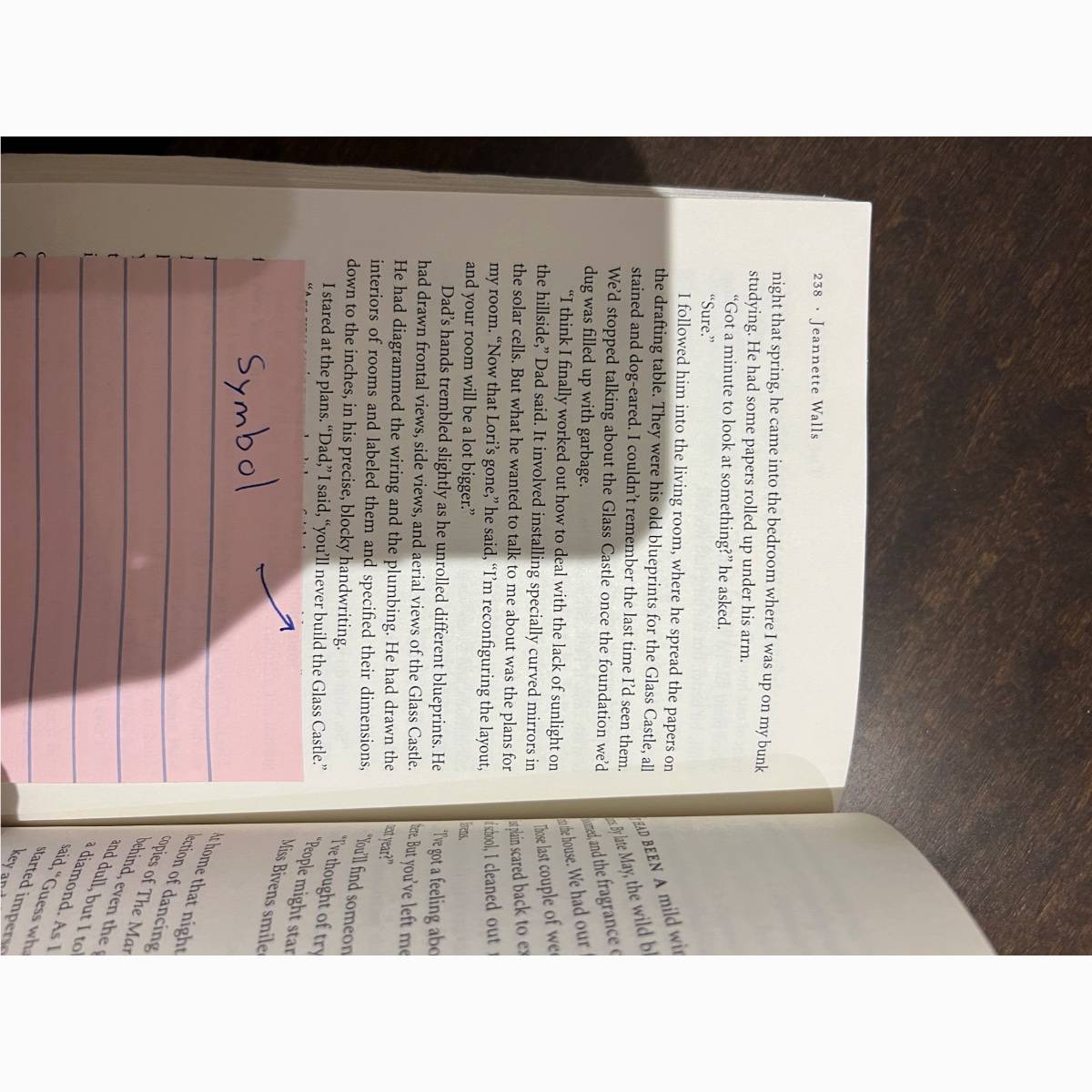
Symbolism is a literary device used in this novel through the promise by Rex Walls to build the glass castle. The symbol of the castle represents hope and promise in the beginning, but as Jeannette grows older it comes to represent broken promises and a loss of hope. This adds depth to every action surrounding the castle, especially when Rex fills in the foundation that was meant for the castle.
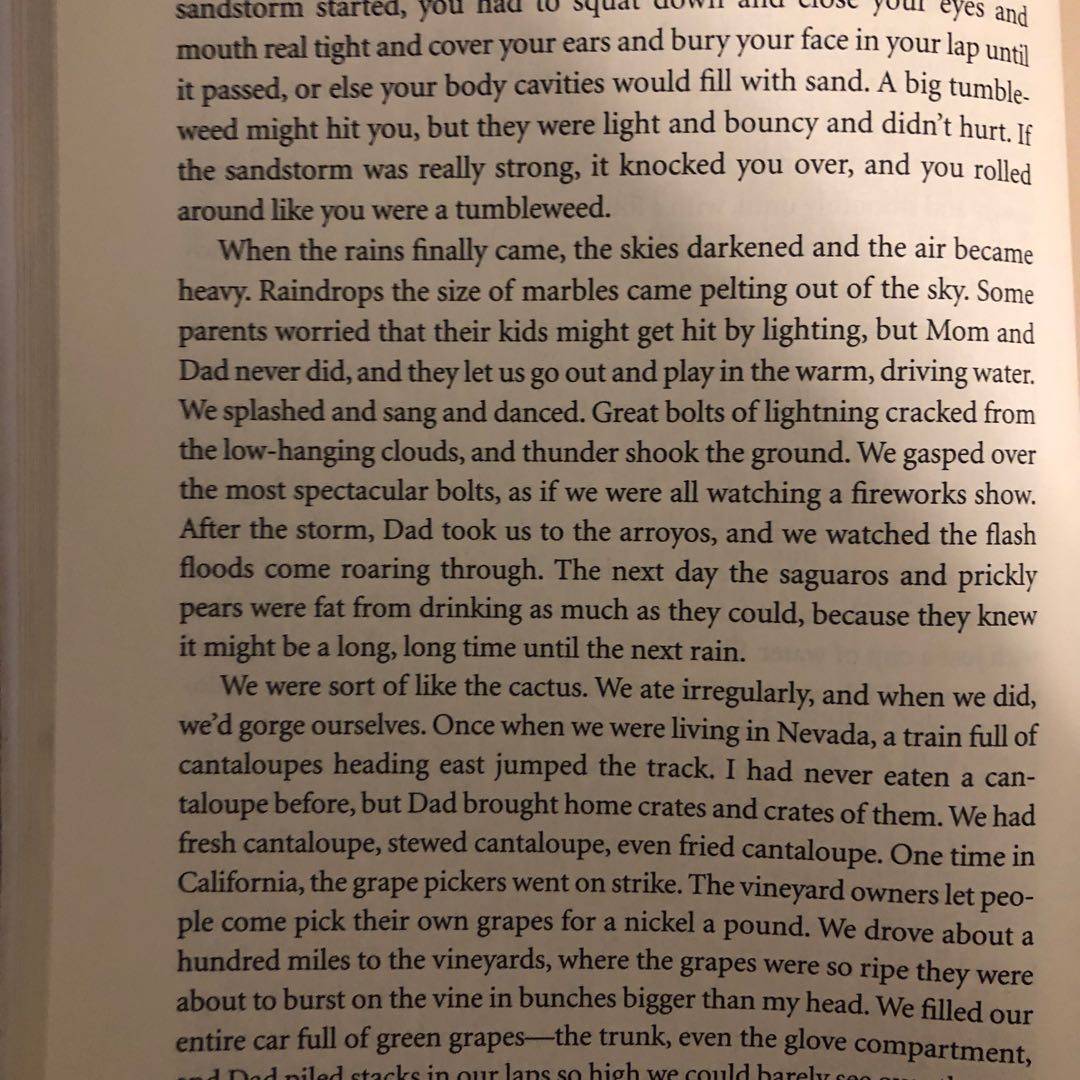
A literary device used The Glass Castle is similes. Similes are used by authors to give a better understanding of certain details. For example, Jeannette uses the simile, “We were sort of like the cactus” during her time in the desert. Even though it is not stated directly, readers can determine that her family‘s living conditions were not well. Jeannette uses similes frequently throughout her novel to give a better understanding of her life.
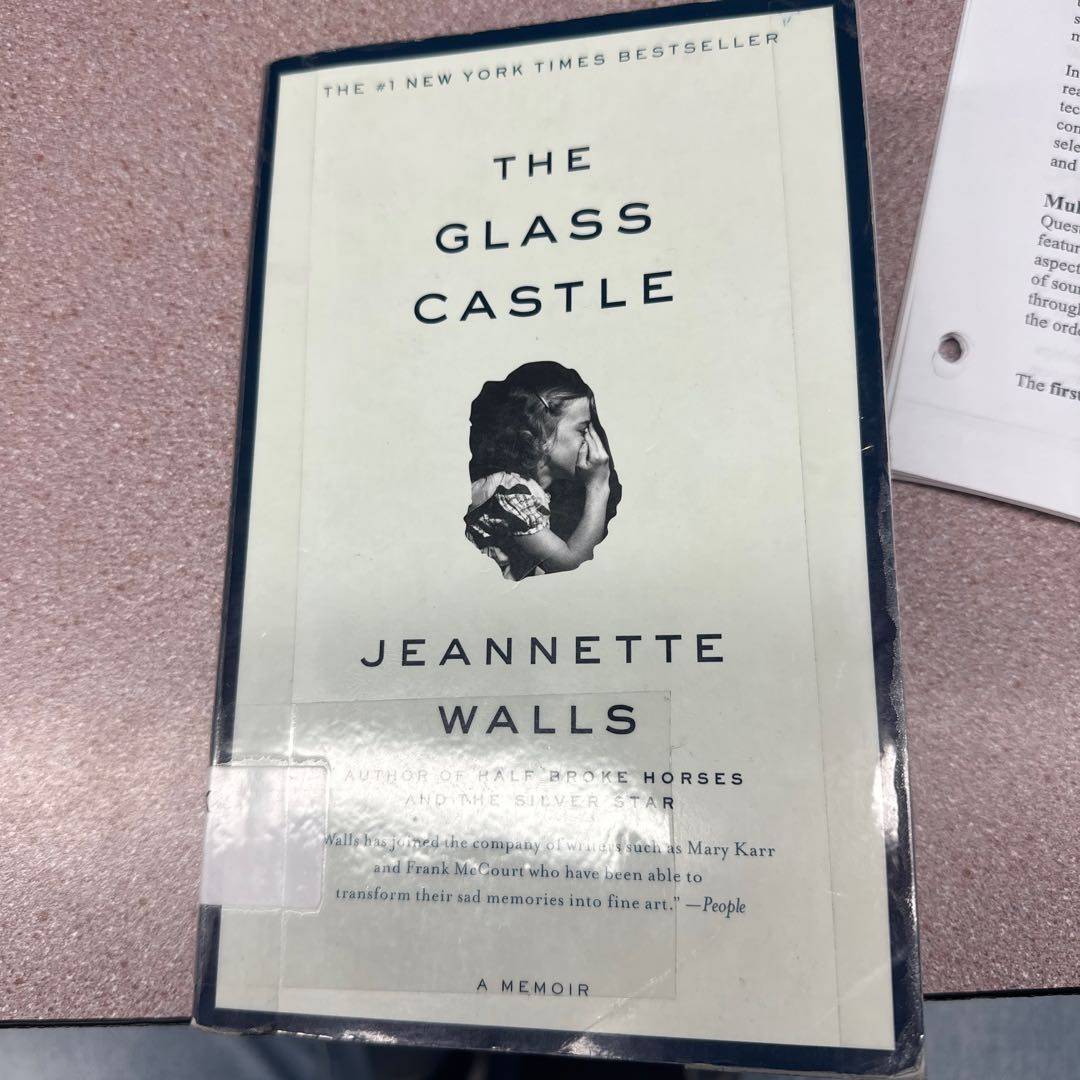
The Glass Castle, Written by Jeannette Walls is a tornado of emotions, starting with sorrow and having little touches of happiness throughout. Rex walls (the father) portrays and shows us this idea of an abusive father who can‘t keep his promises which inflicts pathos to any reader. This shows us how even in our own life there are many issues, but this idea of catharsis we feel whist reading makes us realize how good we actually have it.
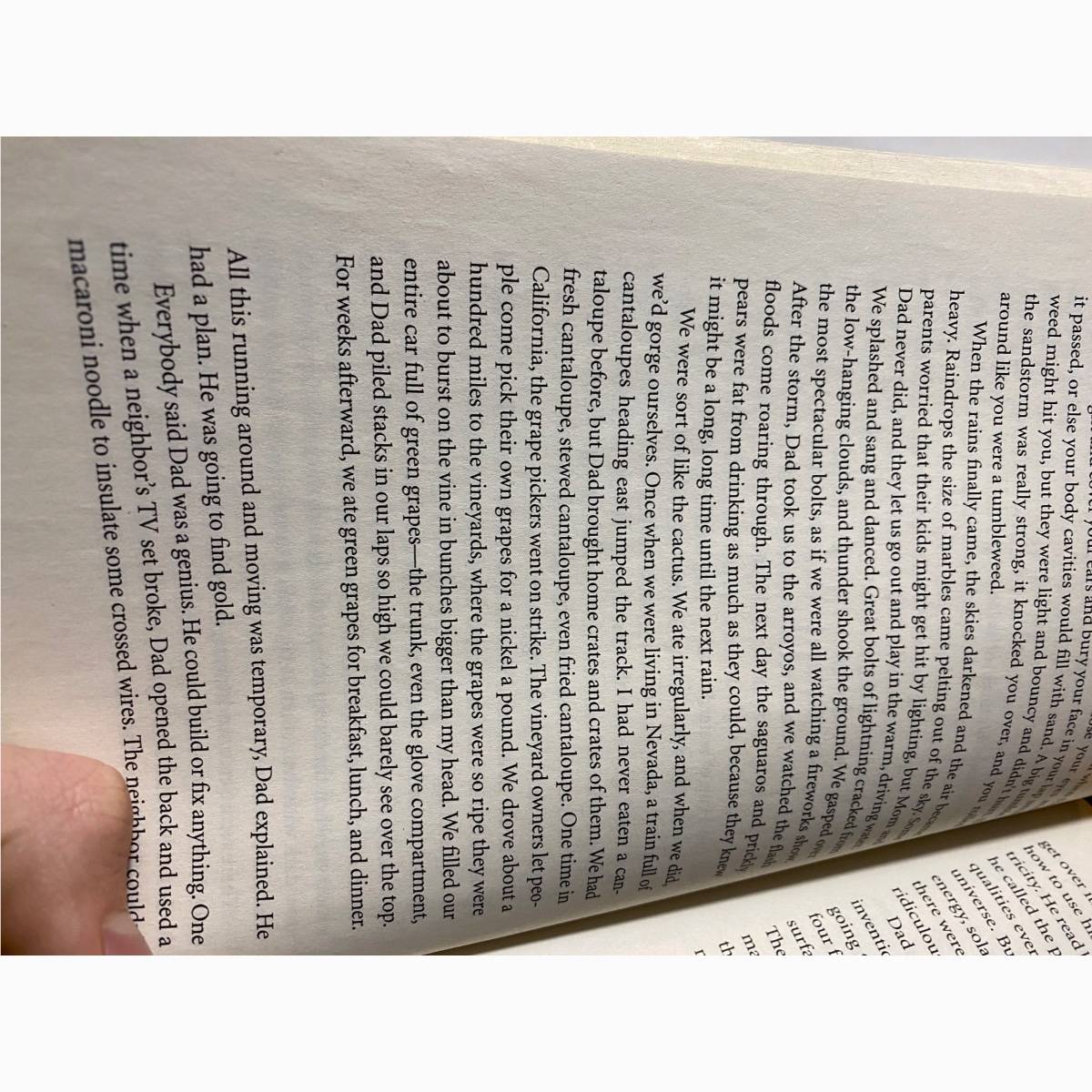
A literary device used in the Glass Castle is a simile. This literary device makes it possible for Jeannette to show us instead of telling us about her circumstance. I think that she uses this device as a means to demonstrate how desperate of a situation she was in. I believe that this simile is used to convey the lifestyle they lived and how dependent they were upon the “land and rain” like the cactus.

The metaphor used to compare her family with a cactus I thought was very powerful use of the literary device. “We were sort of like cactus. We ate irregularly and when we did we gorged ourselves.” I believe this was put into the memoir because it serves as a reminder that cactus are designed to survive on so little and so did Jeannette thought her childhood. It also enforces the idea that they take what they can in order to survive in any means.
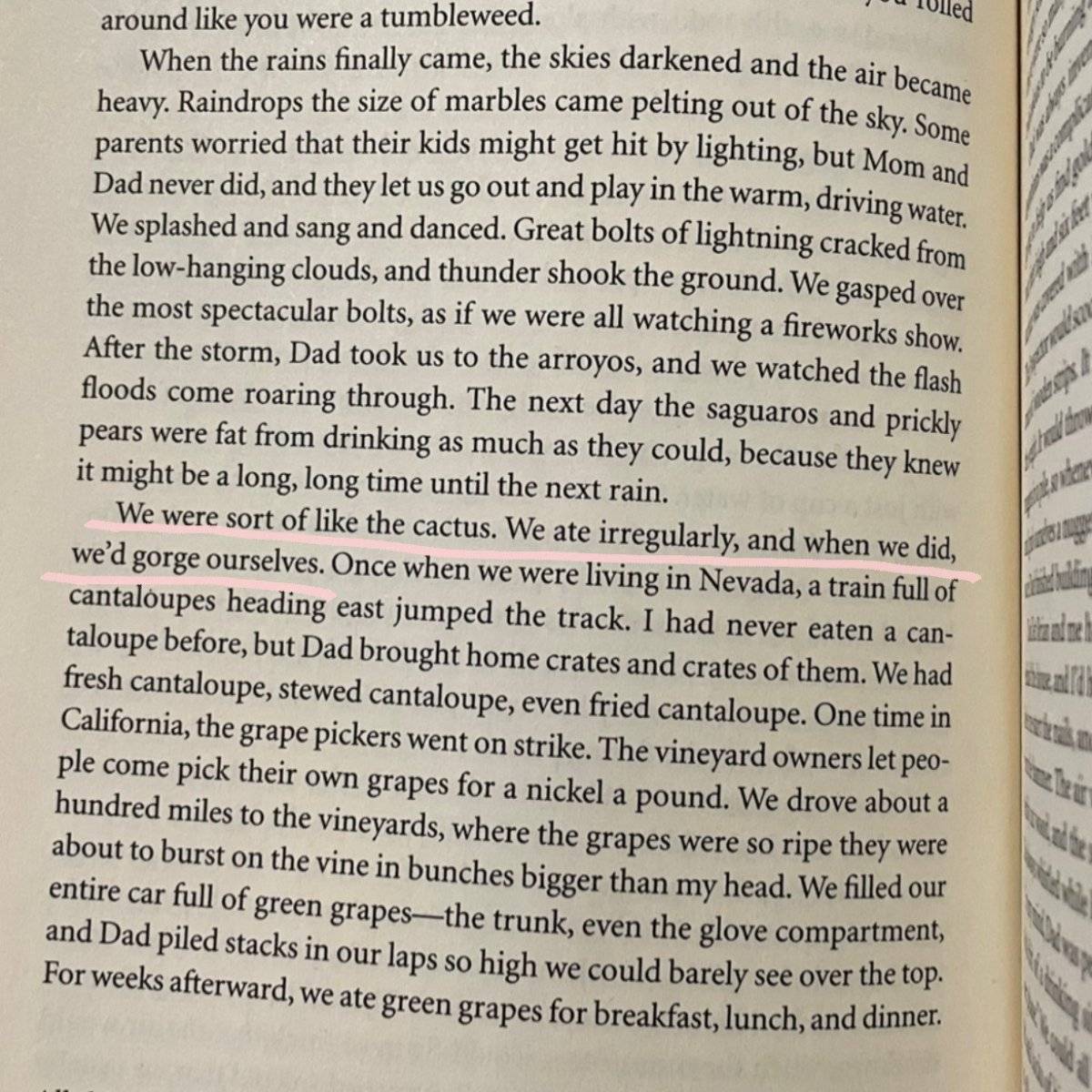
A literary device used in The Glass Castle is analogies. An example of this would be Jeannette stating that “[they] were sort of like the cactus. [They] ate irregularly, and when [they] did, [they'd] gorge [themselves]“. This literary device adds to the story because it accurately depicts how appalling Jeannette's family life is. The Walls family does whatever they can to survive their difficult living situation, even if that means forgoing food.

The personification of fire in the early stages of the book. Using personification evokes strong imagery in the reader about the details and properties of the inanimate object, helping to create a sense of depth and immersion.
Authors use personification to describe things that seem impossible to describe without using human-like action, as well as to create a sense of relatability.
More in comments
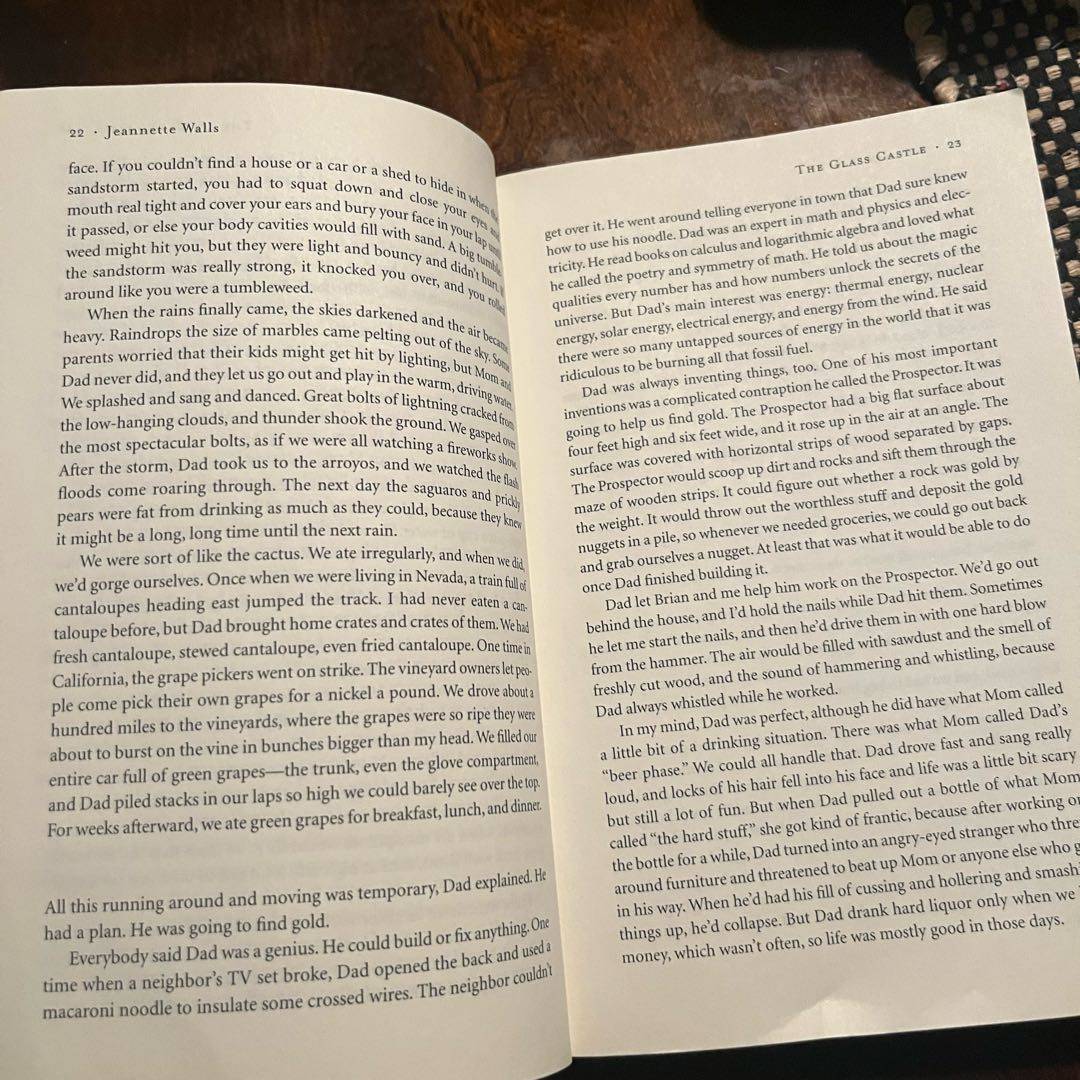
A literary device that is most frequently used throughout the book are similes. For instance, Jeannette says that, “we were sort of like catus. We eat irregularly and when we‘d did, we‘d gorge ourselves” (22). The literary device adds enthusiasm, gets you into the jyst of the story. The author uses similes because it helps us get a better understanding of what‘s happening in the story. I like how Jeannette uses these similes because I get better
The motif of fire in this novel is a beautiful literary device. Fire represents the Walls family‘s destructive tendencies, as well as Jeannette‘s tendency to try to “burn” her past and move on from it. I think Jeannette chose to tell these stories about fire because it really encapsulates her childhood experience with her family. At first, the motif kind of confused me, but as the story continued it started to make a lot of sense.
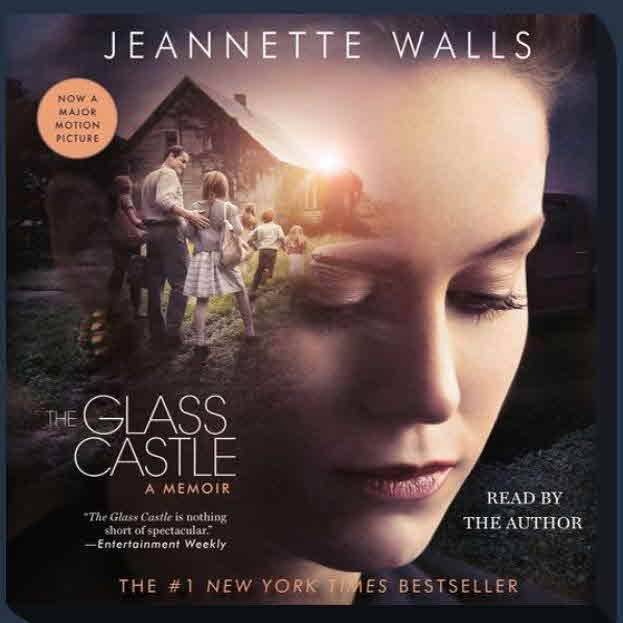
This book is infuriating me... I can't believe the negligence of these people and absolute narcissism!!! These parents are the strangest people & I struggle to think that nobody reported them!!!
**Edit - I jumped the gun... lol
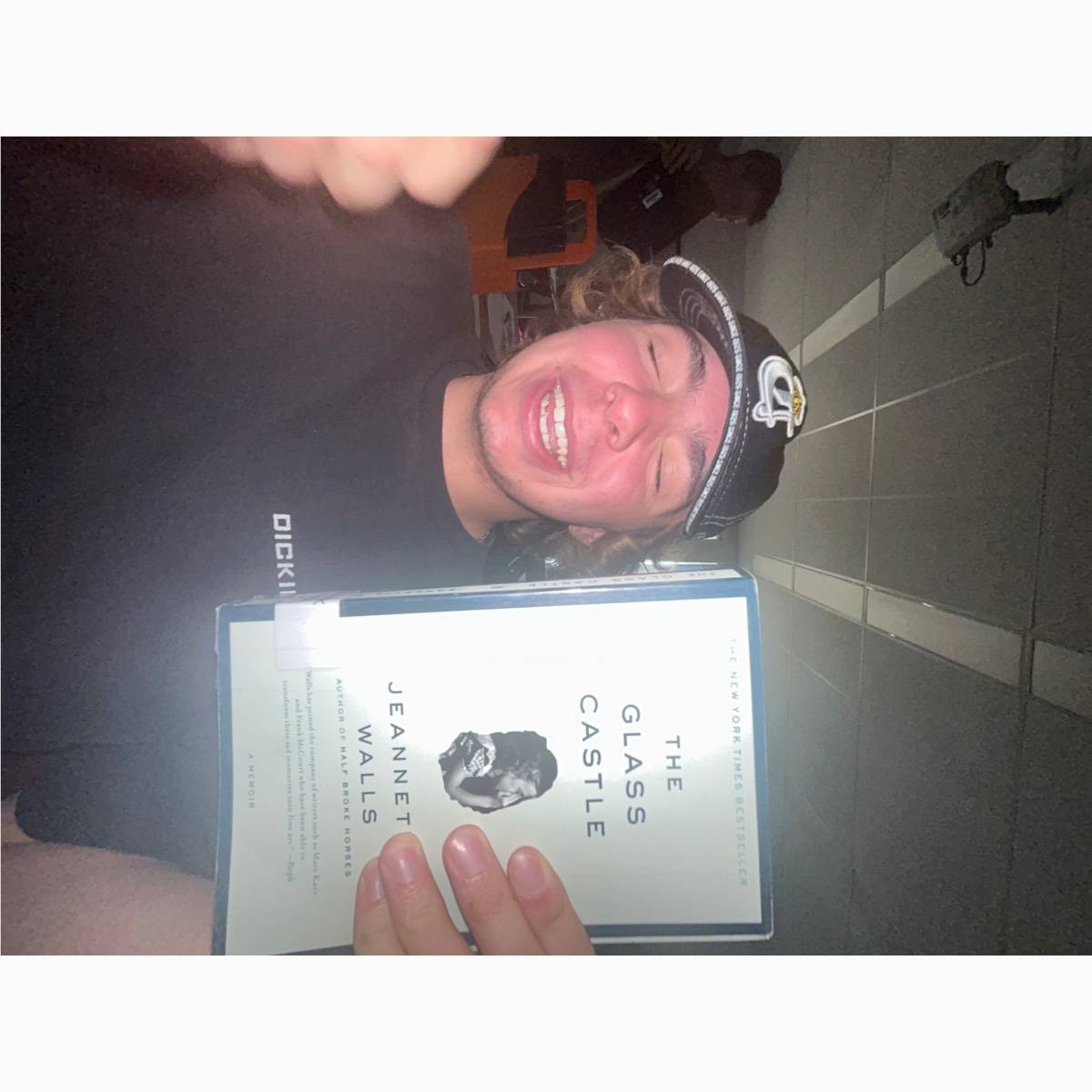
The importance of education in this novel is very importanythe family values education much differently Rex walls seems to want to teach them perseverance and to be tough, this can be seen from when Rex walls teaches Jeanette to swim from throwing her into the water and making her figure it out on her own.
Jeanette walls is the protagonist but also a round character she changes throughout and struggles with actual challenges.
#readingwithfriends

The theme of the novel is growth and acceptance, Jeanette is a dynamic character because as we see at the end of segment 3 there is a change in how she sees her family especially her father who she starts to doubt and accept that her father will bring them all down with him. Not only her father she starts to see the selfish nature of her mother. I chose Jeanette because she resembles no matter what life gives you can still change and grow

The themes in this book include poverty, the need for education and knowledge. Jeannette strives for knowledge and education in the book but her family disagrees with her ways and are very minimalistic and poor. I chose Jeannette because she is a very ambitious and outgoing person. She has strayed away from her parents because she did not believe in there ways. For example when she was in the hospital and her dad was acting crazy towards the nurse

A Theme present in the novel is the glass castle dream of Jeannette and her father Rex. They have blueprints for a glass castle (a glass house) worked up and it is their dream to build it when they become rich and successful. This shows an ongoing theme of unfulfilled goals/ dreams/ expectations. The children are constantly let down by their parents, they don‘t have a permanent home and no stable family life. Rex is a round character…

A theme you could pick out in The Glass Castle would be adversity and what it takes to overcome it. Jeannette Walls has to overcome the adversity of having no money and no real home. This adversity molds and shapes Jeannette into a hard working and resilient child. Rex Walls or the father is the definition of a flat character. Throughout the book he doesn‘t change much while thinking he knows what‘s best. Rex does do his best with what he has …

A theme present in the novel is how their parent‘s addictions frequently negatively affect the children‘s upbringing. This is present in Jeanette as her acquaintances that she makes will often turn their backs and have hidden motives such as Billy Joel. Another way this impacts her is how she is unable to stay in one spot due to Rex‘s choices to move around so much. Jeanette would be considered to be a round character because many of her…
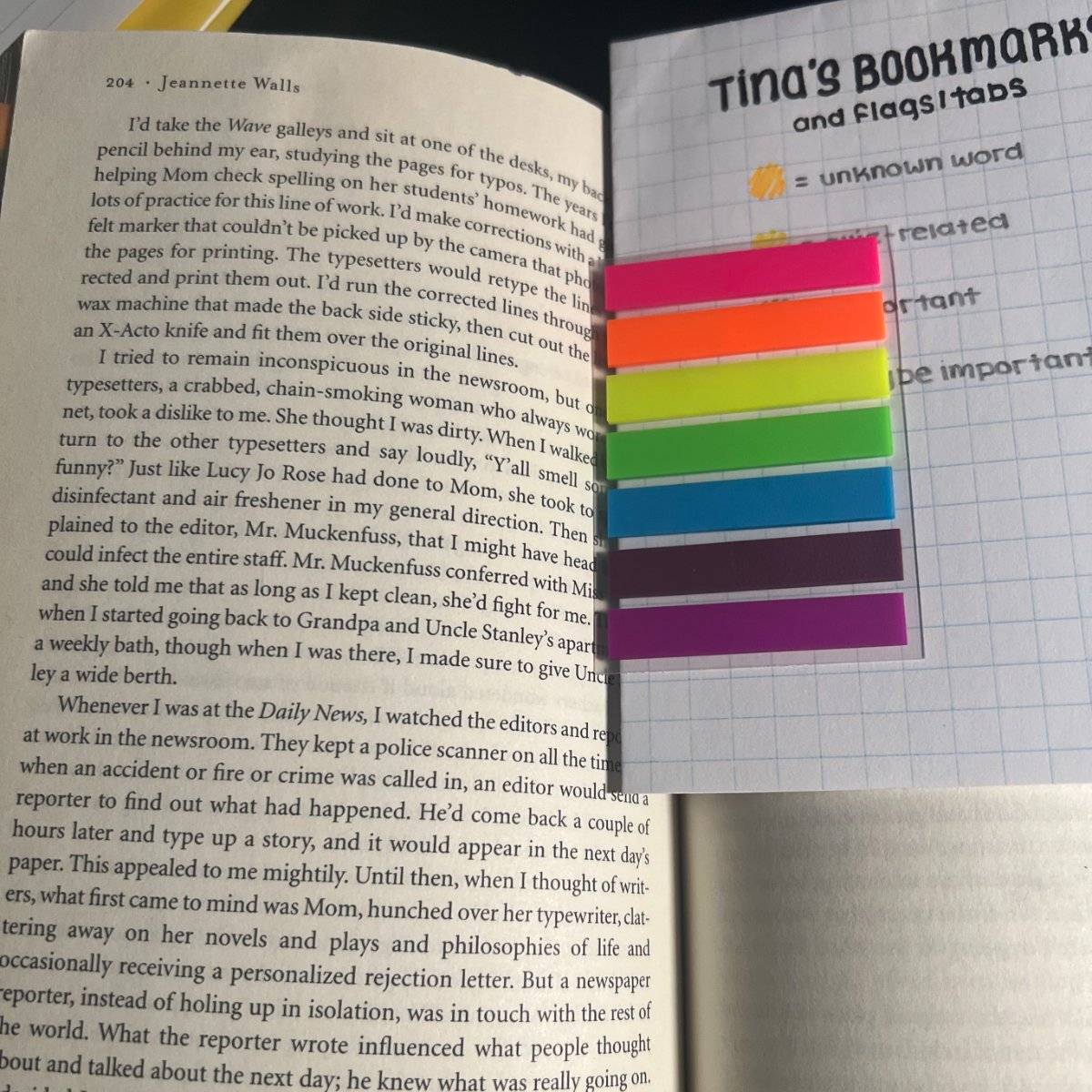
One of the themes that I absolutely adored (and can't wait to see more) in this book is the importance of family to each character. Our view, however, is limited to only Jeannette's inner thoughts and emotions; but it's evident in each memory that the Walls kids care about one another.

The glass castle is a beautiful book about Jeanette Walls life as she navigates a challenging and non-traditional childhood. One of the major recurring themes within this book is delusion, disillusionment, and the impact it has on one‘s innocence. It is shown repeatedly how the family goes from town to town on “adventures,” seeking a new start where they would finally have a better life.
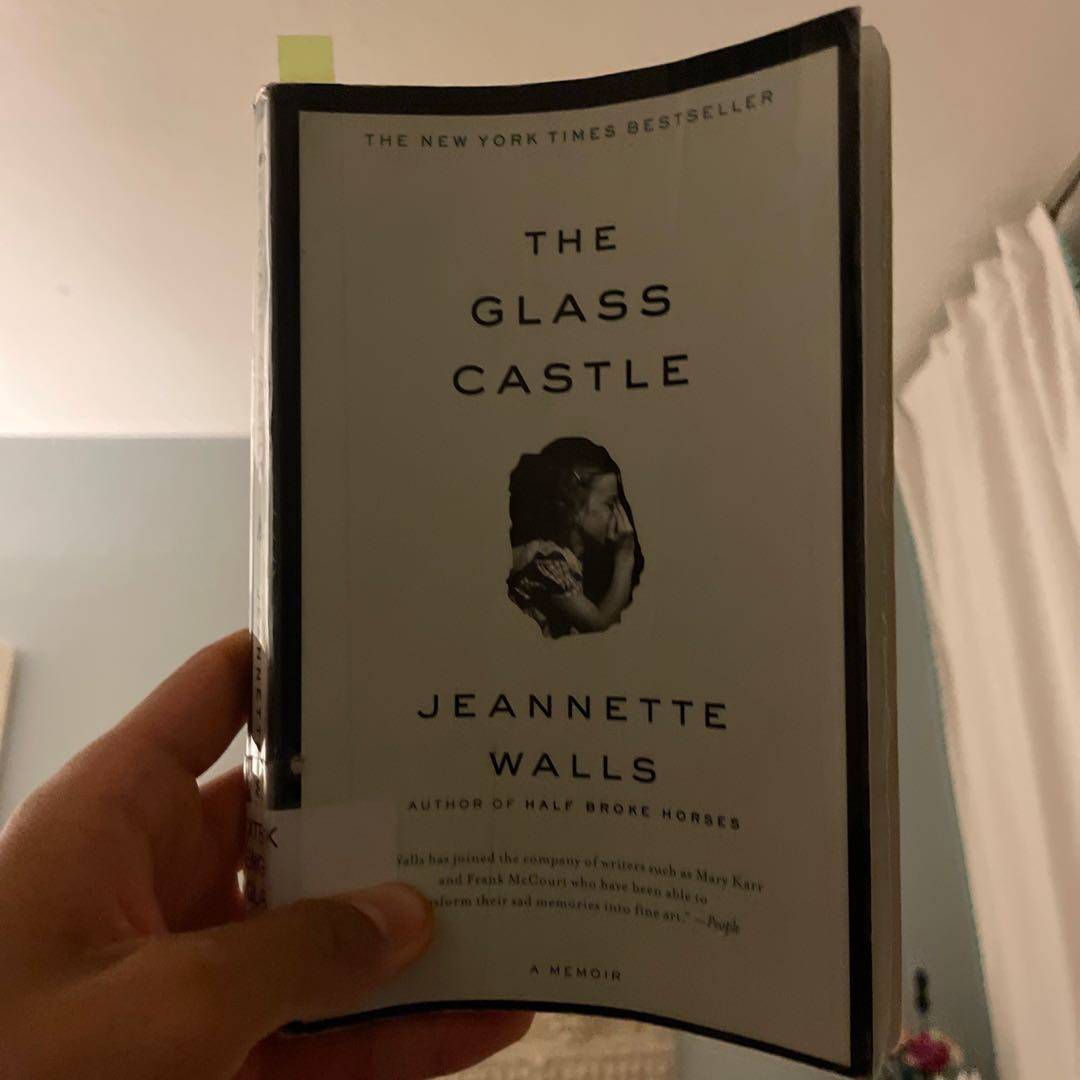
The Glass Castle is a great book that I would recommend to people who love first person books that are chaotic and make you feel right in the moment. The book is very descriptive and holds many themes and symbols throughout the whole book. The Glass Castle brings you through the life of Jeannette Walls and her dis functional family as they follow their father in search of riches. This book has many ups and downs as the Walls try to find their

The Glass Castle shows multiple themes throughout the book but a recurring theme is the independence of the Walls family. Jeanette Walls, who is the main character and author of the book. We see the world through her eyes and thinking, being a first person view. We see through many cases of how she deals with situations by herself for usually the better for her family. Jeanette overcomes her challenges by using her intelligence and reason.

A theme that is in this book would be nonconformity. This theme is most present within Rex Walls because he is responsible for the “exciting” lifestyle the family lives. Rex could is a round character because his personality seems to fluctuate over time. His character is more complex as he goes through phases of his personality. I chose Rex because of the tactics he uses to make it seem like he is the hero and he is the “saviour” for the family.

A theme present is this novel is the idea of dreams vs reality. We can especially see it in Rose Mary who wants to be an artist, claiming she will be one. Calling herself an excitement addict, always chasing something new. She‘s conflicted at times when she realizes the impoverished life that her family is living. Out of pressure from her kids she will leave her fantasy world and get a job as a teacher so that the family can make ends meet.
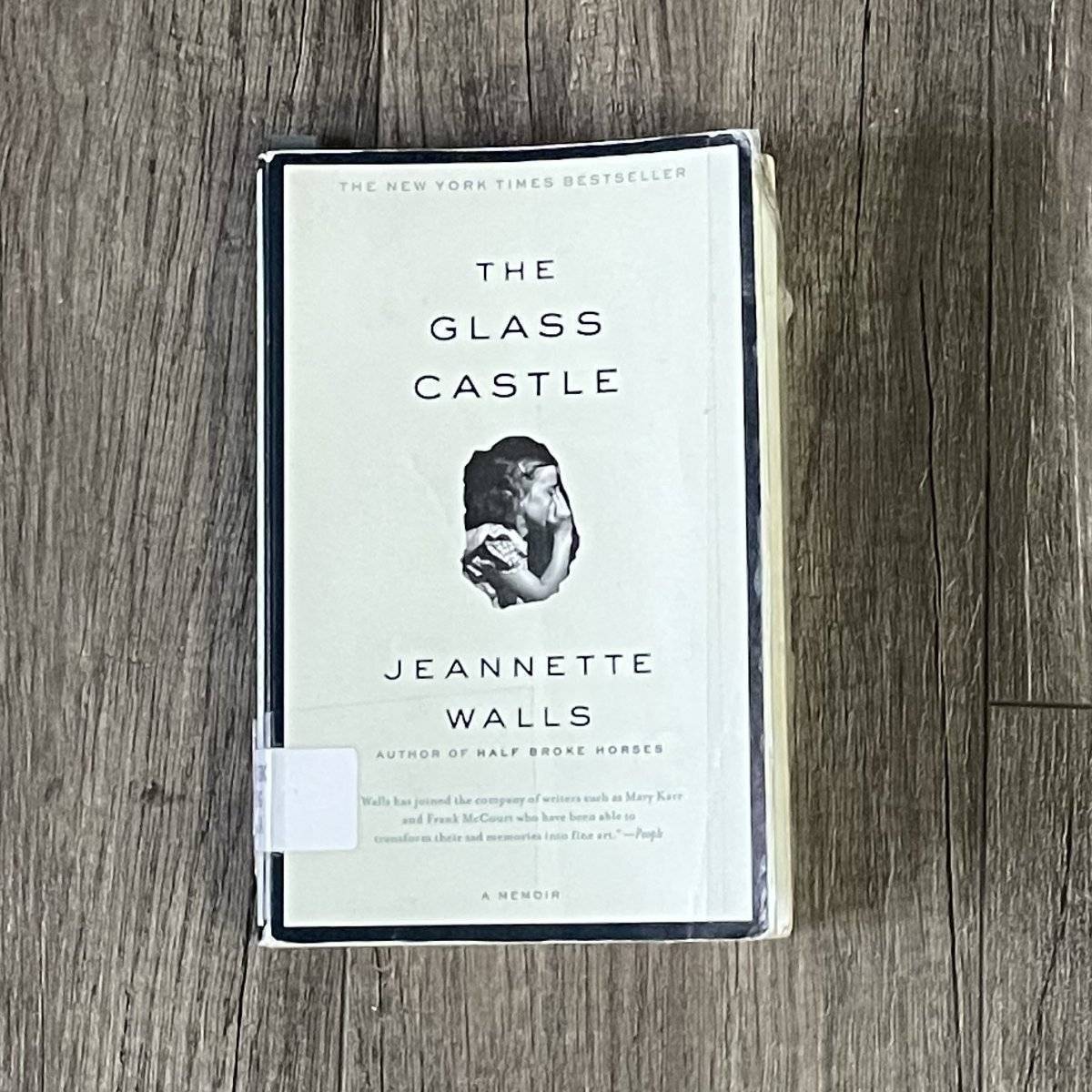
A prevalent theme in the book is abuse. This is shown many times throughout the novel by Rex, Billy Deels, and even Erma. The character I have chosen is Rex Walls. He illustrates the theme through the way he treats Rose Mary. He has dragged her into their car and dangled her from a second floor window; their fights always indicate a form of abuse. It also becomes apparent that alcohol abuse runs in the family after reading about his mother. (1/3)

In the novel there is an overall theme of nonconformity. Rose Mary displays this theme through her refusal to conform to societal standards and through her choices to not work. She is an interesting character overall as she is very much a flat character that continuously refuses to provide for her family. I chose Rose Mary because it is so hard for me to understand her situation and relate to her. She is a terrible influence on her kids.

A potential theme for the novel is perseverance. This theme is present throughout the novel as Jeannette, the main character, and her family have to constantly move. During these “adventures” as her parents would classify it, Jeannette is faced with various challenges, mostly caused by her parents. Nevertheless, Jeannette and her family persevere and manage to stay somewhat happy. The family could separate, but—at least for now—they don‘t.
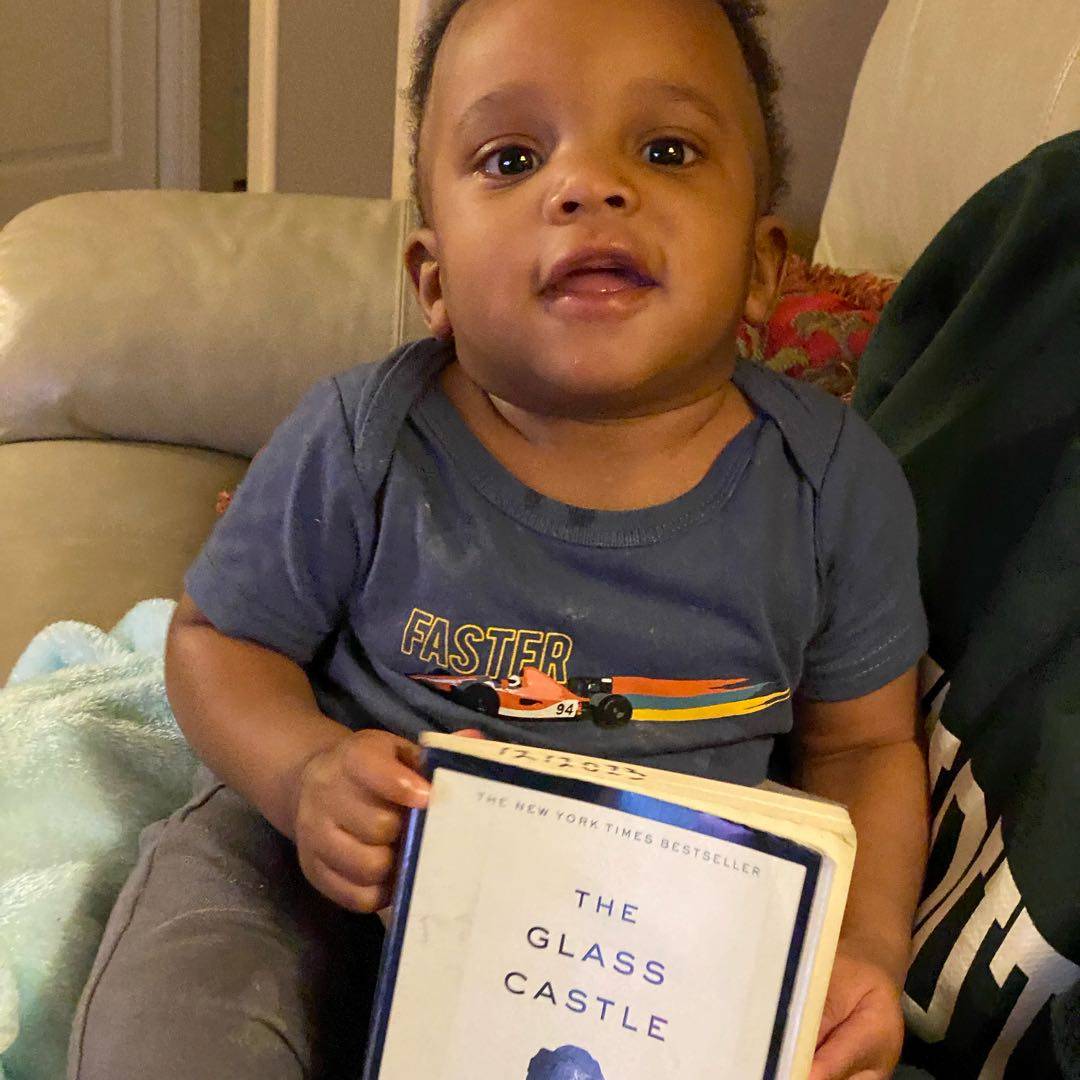
Escapism is a major theme in the story,shown most in Rex Walls.Rex is chased by the cops for crimes he has committed but he chooses to look at the situation as an adventure then a danger.Lori is more a static character in the novel, she didn‘t change much through the story nor did she talk much. It seems like Lori has just given up overall with her parents principles, the limited info the novel gives on her builds my curiosity about her even more.

This book is incredible! It will make you want to cry and yell at the same time. The Glass Castle tells the story of a young girl trying to find her place in her highly dysfunctional family.
Everywhere she goes, chaos and mania follows. Whenever her family begins to settle down and her life gains some semblance of normalcy, the little world she has created for herself is striped away as she moves once again.
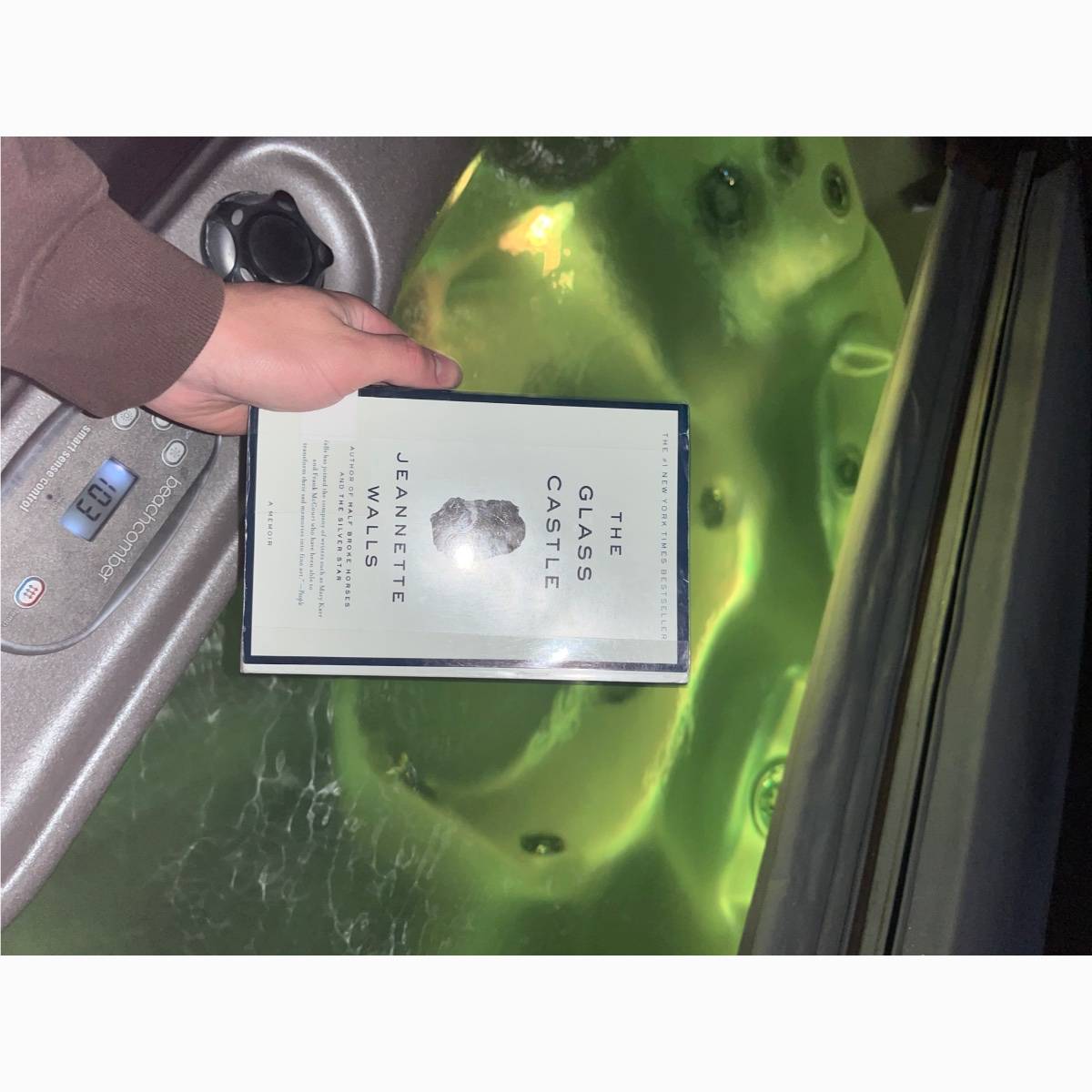
A common theme in the novel is fire which is closely related to Jeannette. It was introduced that Jeanette was connected with fire when she had a cooking accident which left her burned. Jeannette is the protagonist of the novel and is a dynamic character as we see her development throughout the story. Jeannette is positive and adventurous even with the adversity she faces growing up. I chose Jeannette because I keep reading to see how she matures.

The Glass Castle presents a theme of false hope. Throughout the novel, Jeanette (the narrator and protagonist) is constantly putting her hope in things that let her down. Things like the promises of her father, their temporary homes, and the friends she meets in new places. Jeannette is a very relatable character who‘s emotions are very strong. Because she is the narrator we also get a very in depth description of how she feels in all scenarios
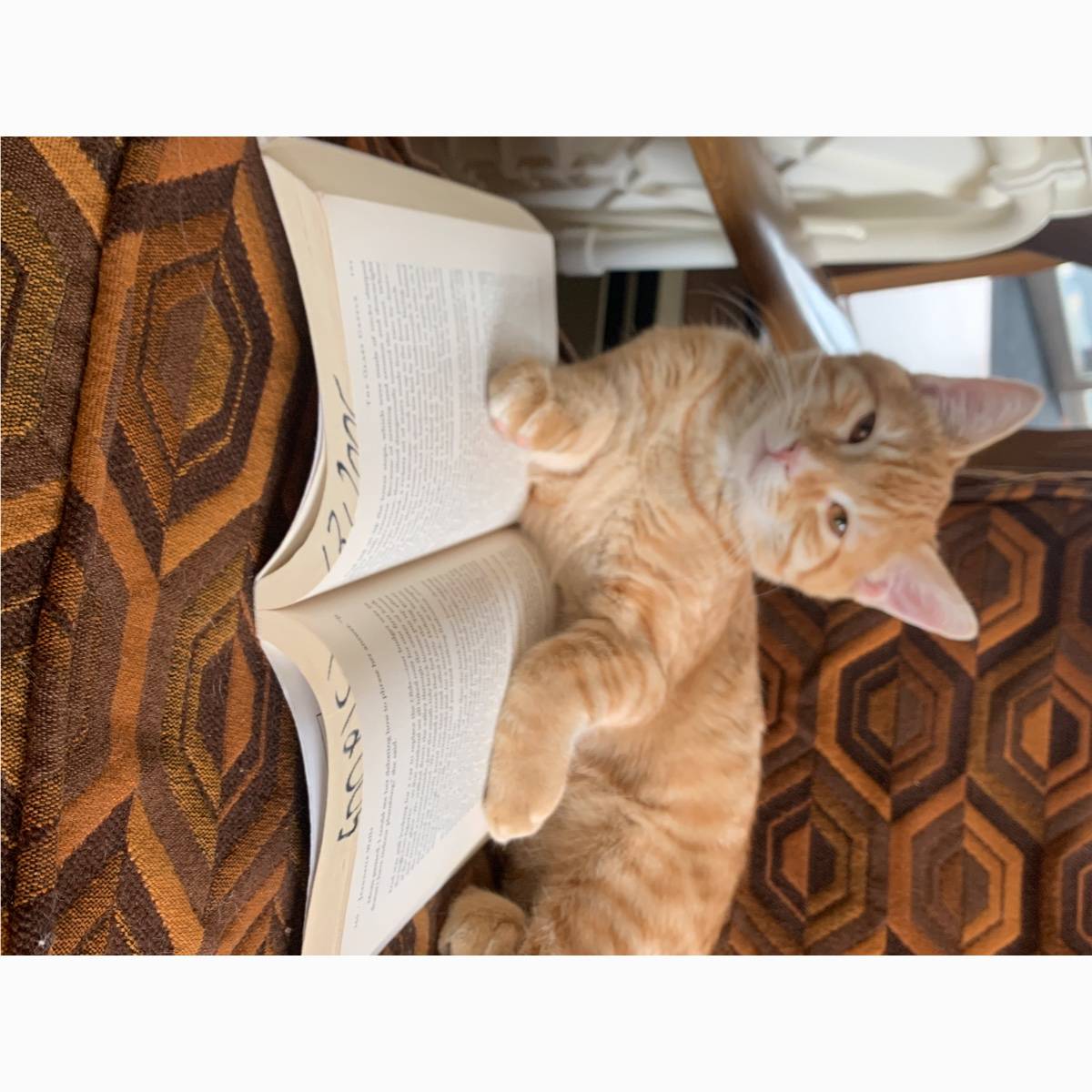
“She had light brown […] deep red lipstick. She looked just like a movie star.“ By using similes just like this through her book she allows her memoir to come alive. The use of this literary device and many others through her book, it brings the story to a more relatable point. (Post 2)
 2y
2y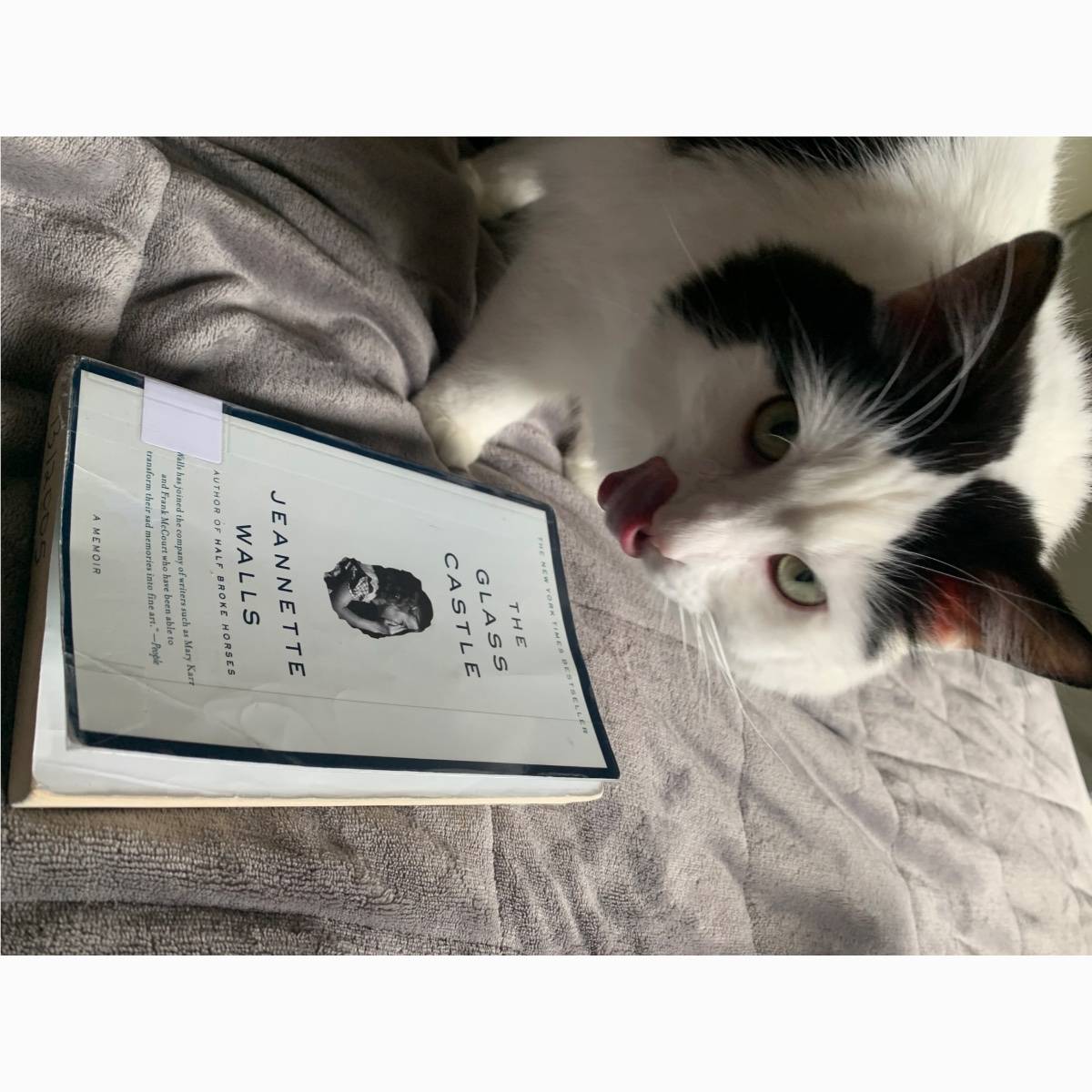
One major theme in the glass castle is, the theme of resilience. Throughout a very chaotic and unstable childhood Jeannette never stops being resilient and always finds a way to survive. She is a dynamic character, learning from her life and making her own way. She is such an impressive woman who no matter what builds her own way in her own life.
 2y
2y